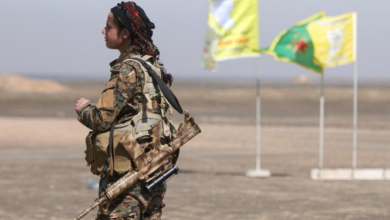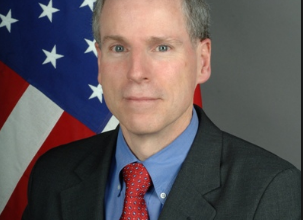
For Syria, August is the cruelest month
For Syrians, August may be the cruelest month. Two years ago at night, President Assad’s grim reapers in the form of rockets laden with chemical warheads visited Eastern Ghouta, a suburb of Damascus and claimed the lives of 1400 civilians, mostly women, children and babies. Once again the Syrians experienced the tragic meaning of ‘the smallest coffins are the heaviest.’
The world was horrified and looked for the sole superpower to exact retribution but that was not meant to be. The President of the United States of America after unsheathing his sword for the battle, took a walk with his White House Chief of Staff Denis McDonough and returned with the sword sheathed, fearing maybe that a strong military slap at Assad’s lisping mouth will not pole well with his political base. Four Augusts ago, President Obama (along with European leaders) explicitly called for Assad to resign, after months of bloody crackdown on civilian protesters. ‘For the sake of the Syrian people, the time has come for President Assad to step aside’ Obama said in a written statement. In the following years, Syrian skies have been constantly raining barrel bombs, ravaging bodies and souls, and cutting deep scars in Syria’s landscape and collective psyche.
Inherently irresolute
Last August, President Obama, shamed by the rampaging hordes of the so-called Islamic State of Iraq and al-Sham (ISIS) who swept into Northwestern Iraq from bases in Syria and occupied Mosul, Iraq’s second largest city, ordered an air campaign against ISIS, later named ‘Operation Inherent Resolve’. One year later, clearly the operation is inherently irresolute.
It is easy to start revolutions and civil wars. It is infinitely more difficult to end and then transcend them
Hisham Melhem
The 17-country coalition armed with 400 strike aircrafts and 1600 pilots launched thousands of strike sorties, killing 12,500 members or supporters of ISIS, in Syria and Iraq, but failed to dismantle or neutralize the assassins of ISIS who were intoxicated with the notion that they have forced the ‘invading crusaders’ led by the U.S. into what looks like an embarrassing stalemate. The Obama administration was initially vague about the length of the campaign to ‘degrade then defeat’ ISIS, but it did later on settled upon 3 years. Recently however, General Ray Odierno, the outgoing Army chief of staff was blunter when he said ‘in my mind, ISIS is a ten to twenty year problem, it is not a two years problem.’
Conflicting priorities and strategies
The recent flurry of diplomatic contacts and initiatives involving the major outside players in Syria; the United States, Russia, Iran, Saudi Arabia, Turkey and a weakened Syrian regime shaken by battlefield setbacks in the North, South and Damascus environs, are driven by concerns to prevent a ‘catastrophic success’ by ISIS or other Islamist extremists, or a sudden collapse of the regime in Damascus leading to mass bloodletting and total chaos. Yet these concerns do not hide the fact that the regional and international parties have contradictory priorities and conflicting strategies to end the war. America’s priority is to fight ISIS, although there is growing realization in Washington that saving what is left of Syria requires getting rid of Assad, the very magnet that attracted the extremists. For Turkey, the immediate priority is to check the growing power of Syria’s Kurds who have declared the de facto autonomous region of Rojava adjacent to Turkey’s borders. Russia’s priority is to organize a regional and international coalition against ISIS and other powerful Islamist groups like al-Nusra Front while keeping Assad during an agreed upon transitional period. For Saudi Arabia, the priority is to get rid of the Assad regime as soon as possible, while helping those opposition groups willing to take on ISIS. For Iran, the outside player with the most influence in Syria, and potentially the biggest loser if the Assad regime collapses quickly, the priority is to cling to Assad as much as possible, while retaining the option of ‘trading’ him in the future in a deal that would safeguard some of Iran’s influence in a post Assad Syria, and secure its access to Hezbollah in Lebanon.
American ambiguities
In a rapidly changing world and conflicting threat assessments, various American institutions and agencies have spoken about contradictory threats to the homeland. The new chairman of the Joint Chiefs of Staff General Joseph Dunford ( like his predecessor General Martin Dempsey) sees Russia as the number one ‘existential threat’ to America, followed by North Korea, China and ISIS. This view contradicts President Obama’s assessment that the ‘greatest threats come from the Middle East and North Africa, where radical groups exploit grievances for their own gain’. Even those officials who see non-state actors as the biggest threat, don’t agree which group, al-Qaeda or ISIS is the most lethal. Last month the Federal Bureau of Investigation (FBI) director James Comey declared publicly that ISIS is a bigger threat to America than al-Qaeda.
Diplomacy and disintegration
The recent nuclear deal between Iran and the P5+1 known as The Joint Comprehensive Plan of Action (JCPOA) gave impetus to heightened diplomatic activities involving the U.S. Iran and Russia. Secretary of State John Kerry said that ‘Iran specifically said to us if we can get this agreement, we are prepared to talk with you about the other regional issues.’
The flurry of diplomatic activities, suggests hints that the outside players are more willing to compromise than before. A senior U.S. official said that the Russians told Secretary Kerry that they have grown ‘tired’ of Assad, but that he should remain in power with diminished authorities during a transition period that could last up to two years, with the prior understanding that at the end Assad and his closest military and civilian collaborators would leave Syria. The official implied that the U.S. is willing to modify its previous opposition to Assad being part of the transitional structure for a relatively lengthy period. Russia and the U.S. are in agreement that any peace initiative should aim at changing ‘the leadership’ but not changing the regime, including the military and what is left of the bureaucracy, to prevent total chaos.
The U.S. is hoping that Moscow could lean on Iran to show more flexibility, hoping that Iran would realize that the recent military setbacks suffered by Assad forces have rendered him more dependent on Iran and its Lebanese ally Hezbollah for his survival. In fact Iran’s recent role in brokering three local cease-fires between Hezbollah and Syrian rebels shows that Syria has fallen to the status of an Iranian protectorate. It is true that Iran and Hezbollah have saved the Syrian regime from falling in the last two years at a considerable financial cost to Tehran and a mounting human cost to Hezbollah. But it is also true that Iran is reluctant to send troops to maintain Assad in power indefinitely, and that there are limits to what Hezbollah could further do in Syria. All of these activities and machinations are taking place while the world is watching Syria slowly disintegrating, unwilling or unable to alleviate the worst humanitarian crisis in the new century.
Whither Syria?
Over the last four years many a peace plan and many an international envoy failed to stop the slow death of Syria let alone resolve its myriad conflicts and polarizations. There is a growing concerns among Syria watchers in the United States, that unless President Obama decides to move boldly in the next six months, independently and in collaboration with allies to first confront head on the humanitarian crisis, through the establishment of a safe zone, to be protected by American air muscle, the price the Syrian people will pay will be truly staggering. In few months, the so-called ‘political season’, that is the presidential elections will engulf the country and its leaders including the President. If the current window is closed, it means that the U.S. will not do anything meaningful in the first year of the new President, since it will take him/her a year at least to set up a functioning administration.
No one knows how the current diplomacy will proceed, or whether the contending powers could agree on a realistic road map to a solution. It is a false choice to invoke the binary of either ISIS or Assad. Both have engaged in killing civilians on mass, albeit with different tactics and tools. In their dungeons hundreds and thousands of innocents disappeared. The devil’s rejects of ISIS have established a ‘Theology of rape’ with its sickening rituals, fake religiosity, and slave markets as chronicled here by the amazingly talented Rukmini Callimachi.
Many a young Yazidi girl will be scarred for life. In recent years, August has become the cruelest month for Syrians, although Syrians have been bleeding in all seasons. But August is a reminder that Assad and his regime are still lingering on, killing and tormenting, notwithstanding what the American President says or does.
It is easy to start revolutions and civil wars. It is infinitely more difficult to end and then transcend them. Even the best imagination is inadequate to imagine a Syria whole and united any time soon, or ever. One shudders to think of how many Syrians will perish before the madness is stopped? How many more people will be uprooted? How many Christians will be exiled? Didn’t the world realize that Egypt and Iraq have yet to recover from the loss of their Christians, Jews, Greeks, Armenians and other minorities that made a rich tapestry of languages, sounds, tastes and colors in Baghdad, Basra, Cairo and Alexandria? How many Sunnis and Shiites will be demonized before they are killed? How many graceful churches and Mosques will be trampled upon by the new hordes of darkness? Can anything replace Damascus, Aleppo and Palmyra?
______________
Hisham Melhem is a columnist and analyst for Al Arabiya News Channel in Washington, DC. Melhem has interviewed many American and international public figures, including Presidents Barack Obama and George W. Bush, Secretaries of State Hillary Clinton and John Kerry, Secretary of Defense Robert Gates, and Chairman of the Joint Chiefs of Staff Admiral Mike Mullen, among others. He is also the correspondent for Annahar, the leading Lebanese daily. For four years he hosted “Across the Ocean,” a weekly current affairs program on U.S.-Arab relations for Al Arabiya. Follow him on Twitter: @hisham_melhem
alarabiya.net



